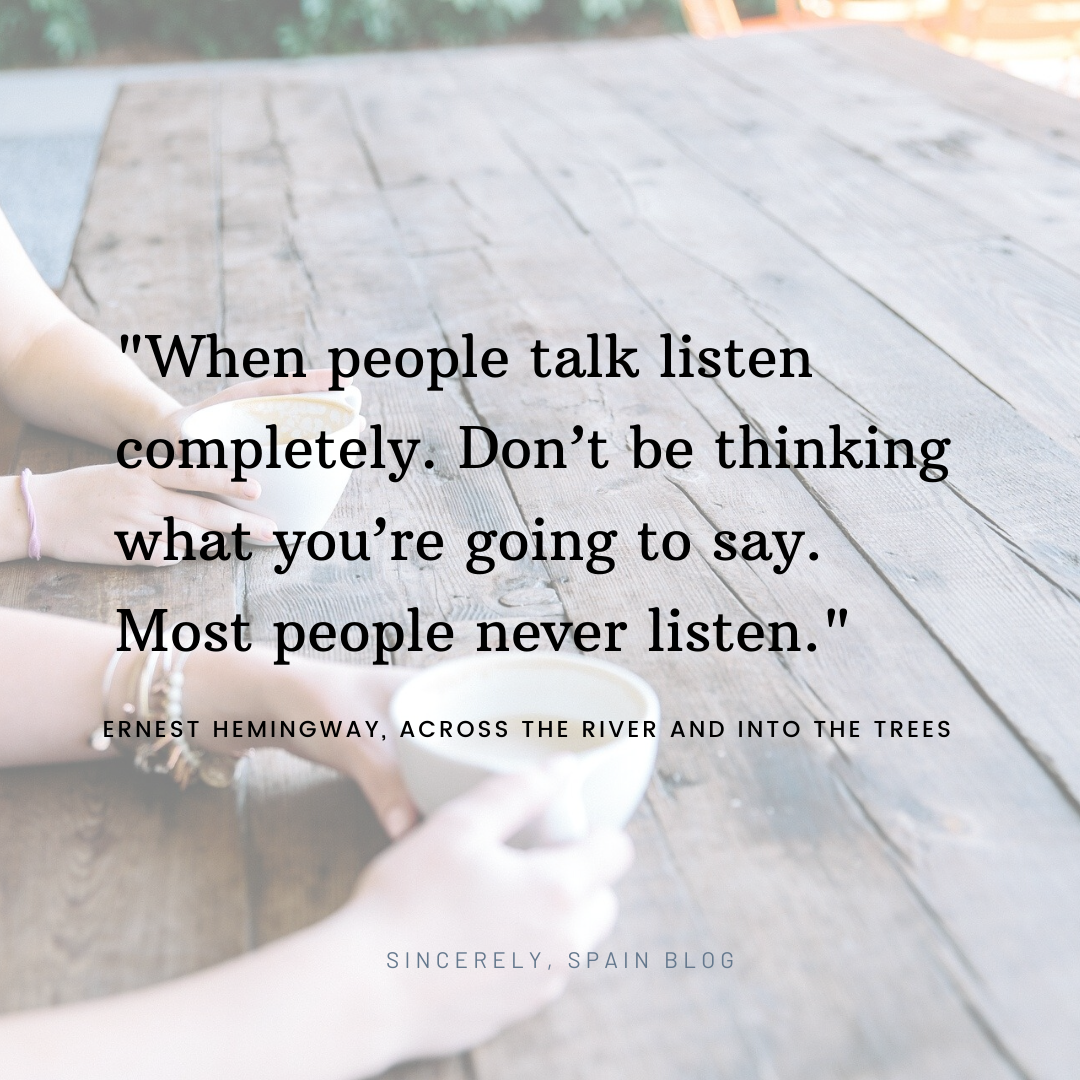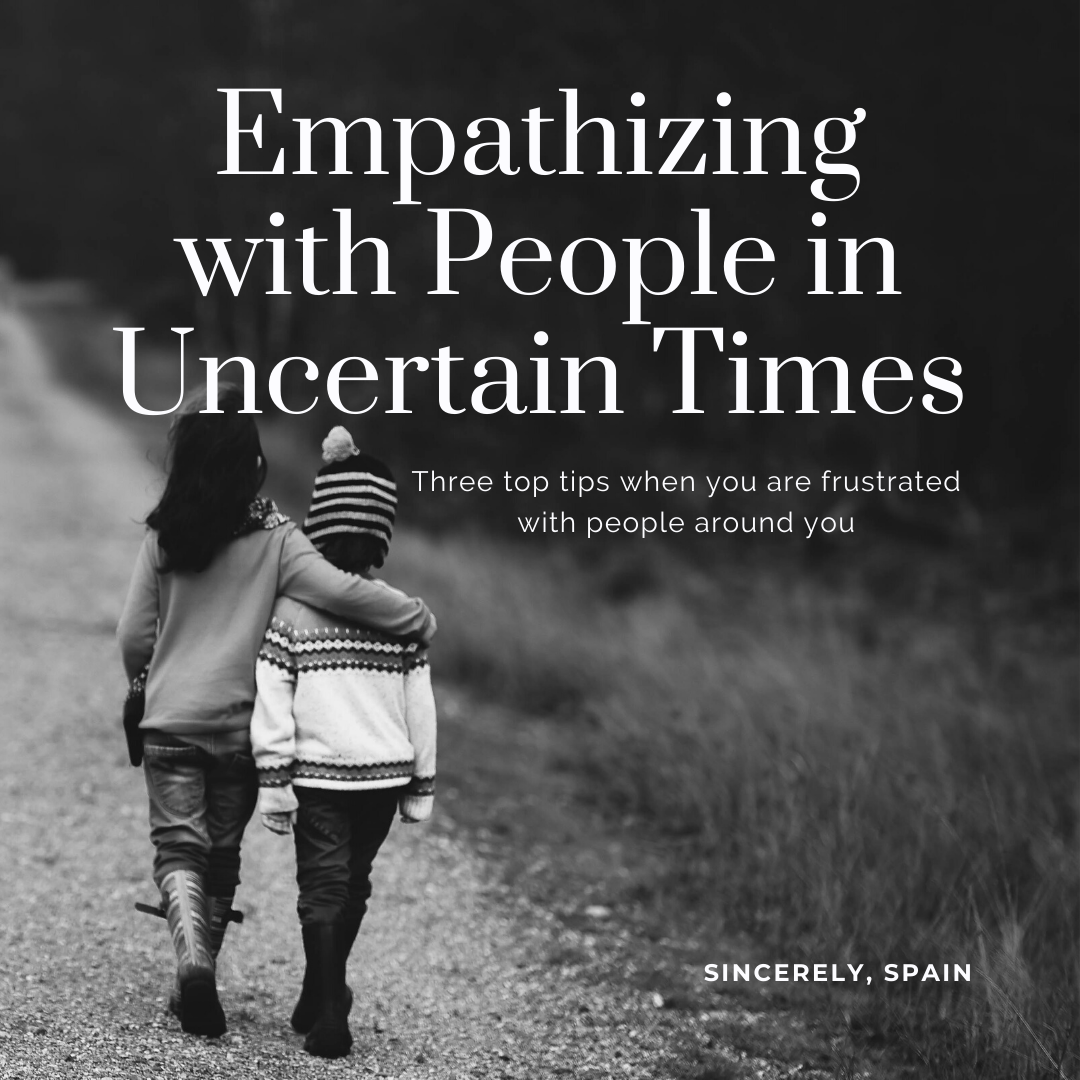
Empathizing with People in Uncertain Times
Dear Lewis,
These days it seems like we are all in our respective homes, around the world, living a very similar, yet very distinct, reality. Whether it be for a quick chat via Whatsapp or a long Skype call, it feels like the contact with people seems more frequent than in the past, especially for those of us living abroad. It is almost as if the people back home, for the first time, are starting to use video calls more frequently and, as a consequence, also want to speak to us abroad. And every time we reach out to a family member or dear friend in another part of the world we get this strange feeling that their lives are quite similar but very different to what we are feeling right now. Heck, even when we (Dani and Claudia) reach out to talk to each other, which we do on a weekly basis, we feel this.
The result is strange because sometimes you feel like you connect completely with what the other person is saying but other times it can feel like they are in a completely different world. We have found that sometimes it can be difficult to empathize, even with our closest family members and friends. That is why today we would like to bring you our top three tips for empathizing when you are talking with people who are in different places, both emotionally and geographically.
 1.) Listen to what they have to say
1.) Listen to what they have to say
When we say listen, we mean really listen. If you can, do not start a conversation to reach any other purpose other than to connect with the person or people on the other side. Many times this means leaving your own personal agenda or feelings aside until it is your time to share. This can feel frustrating because we are sure that you are feeling a lot of things right now, but spending time truly listening to the other person means that you are able to see how they are feeling and understand what they are experiencing.
In times of uncertainty and fear, we may find ourselves talking about things that seem trivial or complaining about situations that don’t seem fair. However, we believe that if you take a little bit of time to listen to what is underneath the surface of what your loved one is saying, you will be able to respond in a way that is better for everyone. And we have found that by listening to the other person you might find that the best response for everyone in that given moment is silence or agreement.
Pro-tip: No matter what your reaction is in the end, start by listening to the other person and really hearing what they have to say.
2.) Put yourself in their shoes:
This is one of the things we were told as children: “before you judge someone, walk a mile in their shoes.” Over the years this has come up time and time again and we can definitely see the importance and power of seeing the situation from someone else’s perspective. In practice, however, it is not as easy to walk in someone else’s shoes. We have found that by starting a conversation by listening to what the other person has to say, you will be more successful in understanding their viewpoint but we also recognize that you should also make an effort to stand where they are.
 At the same time, you may find yourself trying to empathize with people whose current situations are so different to your own, it is difficult for you to imagine where your loved one is coming from. In these moments be patient, both with yourself and with them, as you try to listen to what they have to say and imagine what life is like for them. In some cases, this may mean you are relating to someone who is abroad in another country, a person who has to follow different rules. For other people, this might be that you are connecting with people whose lives are totally different than yours—people who are essential workers when you are working from home, friends who have families when you are single, loved ones who have gotten sick, or vice versa in any of these situations.
At the same time, you may find yourself trying to empathize with people whose current situations are so different to your own, it is difficult for you to imagine where your loved one is coming from. In these moments be patient, both with yourself and with them, as you try to listen to what they have to say and imagine what life is like for them. In some cases, this may mean you are relating to someone who is abroad in another country, a person who has to follow different rules. For other people, this might be that you are connecting with people whose lives are totally different than yours—people who are essential workers when you are working from home, friends who have families when you are single, loved ones who have gotten sick, or vice versa in any of these situations.
We understand that seeing the circumstances from someone else’s viewpoint is hard (we have trouble with it too), but if you make the effort to empathize with them everyone gets more out of the conversation. In addition, if you are more accepting of them and where they are, we have found that people are more likely to make the effort to see things from your perspective as well.
Pro-tip: Be patient with the whole situation. You may not be able to see things differently but make the effort to put yourself their shoes first.
3.) If you don’t have something nice to say, let it go:
Another tip from childhood, for us, this last tip for empathizing with someone in uncertain times might just be the most important. It seems that it is easier to criticize than to empathize sometimes and, without knowing it, we are trying to give the people in our lives unsolicited “advice” when all they really want is someone to talk to, someone to share their woes with. In these uncertain times we find that, more than before, constructive criticism, even if it comes from the best place inside of you, might hurt the person you are talking to more than you expect.
 That is why we would ask you to remember this simple rule from childhood: “if you don’t have something nice to say, don’t say anything at all.” While it is a simple concept, it will help you maintain positivity with people across all sorts of distance, emotional and geographical. At the end of the day, we figure that now is probably not the time to push people’s buttons as we are all feeling the emotional burden of what is going on around us.
That is why we would ask you to remember this simple rule from childhood: “if you don’t have something nice to say, don’t say anything at all.” While it is a simple concept, it will help you maintain positivity with people across all sorts of distance, emotional and geographical. At the end of the day, we figure that now is probably not the time to push people’s buttons as we are all feeling the emotional burden of what is going on around us.
Of course, there are probably some people in your life that you cannot avoid trying to “help” in these difficult times. And there are probably other people who you would just rather not talk to because they are always seeming to make you feel down. In these situations, we recommend taking some space for yourself, finding some time to emotionally distance yourself from the whole relationship until you are both in a place where you can be positive influences in each other’s lives again.
Pro-tip: Remember that you care about the other person, otherwise you wouldn’t be talking. If you cannot say something that reflects that, better to say nothing at all.
Although both of us over here at Sincerely, Spain live far away from our parents and childhood friends and we are used to being in long distance contact with our loved ones, over the past couple of months some communication has really changed for us. We now find ourselves talking more often not only to the people we are closest to but also with people we haven’t been in contact with for ages. No matter who we are talking to, however, we have found that a little extra empathy goes a long way.
 Have you been communicating a lot with loved ones over the past month or so? How are you finding the situation now? Leave your top tips in the comments!
Have you been communicating a lot with loved ones over the past month or so? How are you finding the situation now? Leave your top tips in the comments!
Sincerely,
Spain




